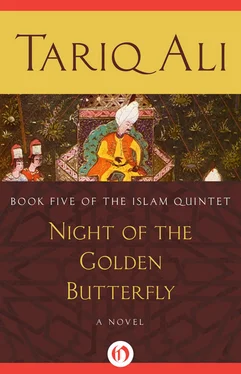Deprived of Jindié’s company for another two weeks, I had time to read her diary at leisure and began it as the train moved out of London. She had provided me with photocopied extracts. They were handwritten, but in the neat scrawl that she and others had been taught by the nuns at a Jesus and Mary convent school in Fatherland and that never got better, usually worse, when the luckier girls finished their education at Nairn College. The extracts I was given began on her wedding day. This irritated me greatly, even though the event was given a three-line entry, dated January 1970. Why was she censoring the earlier years? I wanted to compare her version of events with mine. Instead I got a detailed account of the children, the joys of breastfeeding, teething problems, choice of nursery, speaking Mandarin to them as well as Punjabi, the novels she was reading, described without any sustained reflection. Her father had died in 1974. Her mother had sold the shop and the beautiful old colonial apartment in Elphinstone Buildings and joined them in Washington, enabling Jindié to spend more time away from her family chores, in the university library. The entry on Confucius detained me longer than the others. Even though he had become a blowhard Maoist and severed all connections with his counterrevolutionary revisionist friends, I still had a soft spot for him. He was a brilliant physicist and there is little doubt that had he remained in Fatherland he would have been dragooned to work on the Fatherlandi nuclear bomb. The leaders had been desperate for nuclear physicists. But Confucius, like Maoism, had long disappeared. All attempts in DC and Isloo to get the Chinese embassy to help locate him had ended in failure. He was fluent in written and spoken Chinese. Had he taken on a new identity, changed his name, broken with his recent past and gone in search of other roots, or had he been killed in a factional battle with a rival group? Nobody knew. I couldn’t believe he was dead.
June 1979, DC
Mother very agitated on seeing the scenes from Tien An Mien Square on the evening network news. She’s sure she sighted my brother. I try to explain that Hanif would have little sympathy with most of these students. He would regard them as ‘capitalist-roaders’ and ‘revisionists’. But she won’t listen. Her eyes are glued to the television nonstop these days. We all worry. No letter from Hanif for nearly four years. Before he used to write at least once every three months. I wish he hadn’t gone to China. ‘I must participate in the Great Proletarian Cultural Revolution, Jindié. It’s happening now. History is being made. I can’t stand on one side.’ He pleaded with the Chinese embassy in Isloo for a one-year study visa in 1969 and then disappeared. Did they find him and lock him up for having no legal papers? The Red Guard group he joined was disbanded. He wrote that he was teaching English at a school in Kunming. Then a postcard from Dali. Three letters from Beijing and then silence. I’m sure he would write to our mother if he could. Is he still alive?
24 January 1984, DC
Mother died peacefully today. I got a shock when I took her some tea and saw her lying there stiff with her mouth and eyes wide open. I screamed. Zahid felt her pulse. He examined her and thought she must have died a few hours previously. Her heart stopped beating, but no noise, no attempt to shout my name. It was in her sleep and that was nice to hear. I kept thinking of all the things I should have done for her. I don’t think I ever told her how deeply I loved her and how much I had depended on her in my youth. Even in those days she said things only if she had to. It was Father who talked to us a lot and punished us. She would watch, a wry smile on her face.
It was different with my children. They later told me how she laughed and played with them when Zahid and I were absent. She would talk endlessly about Yunnan and the last days of Dali, telling them the same stories that I had heard from Elder and Younger Grannies, stories that I had put aside, not wishing to burden the children with memories that meant nothing to them. It was after my mother died that Neelam started praying and wearing a hijab.
Hanif’s disappearance weighed heavily on my mother and not talking about it must have made it worse. Whenever I mentioned him she would ask me to be silent. She simply did not wish to talk about it.
We’ve all been weeping. The children, who adored her, insisted on staying a t home today. We buried her late in the afternoon in the Muslim cemetery. Zahid angrily brushed aside the Imam who said that Neelam and I shouldn’t be present.
She never said much after Father died, always felt she was a burden on us. How many times did I reassure her that we couldn’t do without her. It was true. She loved the children and cooked for them, went out with them when Zahid and I were out of town. Her only regret was that she had never visited Yunnan to pay tribute to her ancestors.
I went to the children’s bedrooms in turn to kiss them goodnight. Suleiman was too upset to talk. Neelam asked: ‘Who is Dara?’ I answered quickly. ‘An old, old friend of your father.’ She persisted. ‘And a friend of yours?’ I wondered if my mother had said something, but that seemed so unlikely. ‘Why don’t you answer, Mom? I’ve read your diary.’ I slapped her and then started weeping and hugged her. That night I destroyed the old diary. ‘What difference does it make if she knows?’ was Zahid’s tired response. It made a difference to me. Neelam never raised the matter again. Didn’t sleep all night. I went to the kitchen, made tea the way mother used to and kept bursting into tears as different memories of her queued up in my head. She never lamented the loss of her past, but the children had confirmed that it never left her. I wandered into the attic and opened the suitcase full of old photographs. I was still there when the children woke up the next morning.
But what had she written in the now destroyed diaries? It was not like her to burn anything related to the past. Her father had impressed on his children that archives were an important part of a family’s history. A family without archives was one that was ashamed of or trying to conceal its past for whatever reason. He said that in my presence on one occasion. This was a sore subject in our household, where the servants without thinking had sold my father’s entire archive to the recycling merchant who came to collect old newspapers every month. It was my father’s fault for not filing them properly, but he blamed my mother for having kept them in sacks that were deposited next to the discarded newspapers. I hoped it wasn’t the trauma of reading the now destroyed diaries that had turned young Neelam towards religion. More likely it was the identity politics that is the curse of American campus, life. I carried on browsing, skipping descriptions of holidays till I saw the word Nathiagali on the page. I hoped this might be a more reflective entry.
5 July 1986, Nathiagali
It’s changed. Overcrowded, each new ugly house intruding on another. No planning at all. Depressing being here and this is our first week. The place is full of eyesores. Too much logging has denuded the pine forests. From a distance the mountains look like shorn sheep. The children have heard so many stories about the magic of this place that they’re wondering what it was that Zahid liked so much about it. He was amazed, too; ‘It’s become like Murree and compared to that this was heaven.’ The old club no longer in use. Peeped through the broken window of the Library. The leaking roof was never repaired. Books wrecked. Zahid insisted we walk to the Post Office. Still there but no Younis. The old postman recognised Zahid. Said Younis died a few years ago. Cirrhosis of the liver. There’s a new sub-postmaster. A young man with a flowing beard introduces himself. Tea offered but declined. This young man would never have let D and. Z read letters not intended for them. Yesterday I walked to the Church. Still there as the spot where D and I first felt close. What he would make of this place now? Did he ever return? When? Can’t help thinking about him here… we all walked across the path to Mokshpuri and came down in Doongagali which was less crowded and seemed much nicer. Would D think that too now? He used to be scathing about Doongagali even though two of his friends lived here. He was always teasing them. The children, too, preferred this gali and Zahid asked the locals about land availability. They clammed up.
Читать дальше












